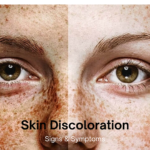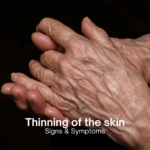Understanding Thickened Skin: Causes, Symptoms, and Treatment Options
Thickened skin, medically referred to as skin hypertrophy or hyperkeratosis, is a condition characterized by the abnormal thickening of the outer layer of the skin. This condition can affect various parts of the body and is often associated with underlying medical conditions or environmental factors. Understanding the causes, symptoms, and treatment options for thickened skin is essential for managing this condition effectively and maintaining healthy skin.
Causes of Thickened Skin
Several factors can contribute to the development of thickened skin, including:
1. Chronic Friction and Pressure
- Repeated friction or pressure on specific areas of the skin can lead to the formation of calluses or corns. This is commonly seen in areas such as the feet, hands, and elbows.
2. Skin Conditions
- Certain dermatological conditions can cause thickened skin. Examples include psoriasis, eczema, and lichen planus. These conditions often result in inflammation and increased skin cell production, leading to thickening.
3. Infections
- Fungal infections, such as athlete’s foot, can cause the skin to thicken and become rough. Bacterial infections can also contribute to skin changes.
4. Systemic Diseases
- Systemic diseases like diabetes, thyroid disorders, and scleroderma can lead to skin thickening. In these cases, the thickening may be a symptom of the underlying disease.
5. Environmental Factors
- Prolonged exposure to harsh environmental conditions, such as extreme cold or dry weather, can cause the skin to become thickened and rough.
6. Genetic Factors
- Some individuals may have a genetic predisposition to conditions that cause thickened skin, such as ichthyosis, a group of genetic skin disorders characterized by dry, scaly skin.
Symptoms of Thickened Skin
The symptoms of thickened skin can vary depending on the underlying cause and the affected area. Common symptoms include:
1. Visible Thickening
- The skin may appear noticeably thicker and tougher than surrounding areas.
2. Rough Texture
- The affected skin may feel rough or scaly to the touch.
3. Discoloration
- Thickened skin can sometimes appear darker or lighter than the surrounding skin.
4. Cracks and Fissures
- In severe cases, the thickened skin may develop cracks or fissures, which can be painful and susceptible to infection.
5. Pain and Discomfort
- Areas of thickened skin, especially calluses or corns, can cause pain and discomfort, particularly when pressure is applied.
6. Itching and Irritation
- Thickened skin can sometimes be itchy and prone to irritation.
Diagnosis
Diagnosing the cause of thickened skin typically involves a thorough medical history and physical examination. In some cases, additional tests may be necessary, including:
1. Skin Biopsy
- A small sample of the thickened skin may be taken for microscopic examination to identify any underlying skin conditions or infections.
2. Blood Tests
- Blood tests can help identify any systemic diseases or nutritional deficiencies contributing to the skin changes.
3. Allergy Testing
- If an allergic reaction is suspected, allergy testing may be conducted to identify potential triggers.
Treatment Options
The treatment of thickened skin depends on the underlying cause and the severity of the condition. Common treatment options include:
1. Topical Treatments
- Emollients and Moisturizers: Regular use of emollients and moisturizers can help soften and hydrate thickened skin, making it more pliable and reducing discomfort.
- Keratolytic Agents: These agents, such as salicylic acid, urea, and alpha hydroxy acids, help to exfoliate and remove the thickened outer layer of skin.
2. Prescription Medications
- Topical Steroids: For inflammatory skin conditions like psoriasis and eczema, topical steroids can help reduce inflammation and thickening.
- Retinoids: Topical retinoids can promote cell turnover and reduce skin thickening in conditions like psoriasis.
3. Physical Treatments
- Pumice Stones and Foot Files: Regularly using a pumice stone or foot file can help reduce the thickness of calluses and corns.
- Cryotherapy: In cases of warts or other localized thickened skin, cryotherapy (freezing) can be an effective treatment.
4. Medical Procedures
- Laser Therapy: Laser treatments can be used to remove thickened skin caused by certain conditions, such as warts.
- Surgical Removal: In severe cases, surgical removal of thickened skin or underlying growths may be necessary.
5. Lifestyle Modifications
- Protective Measures: Wearing appropriate footwear and protective gear can help reduce friction and pressure on vulnerable areas of the skin.
- Good Hygiene: Maintaining good hygiene and keeping the skin clean and dry can help prevent infections and reduce the risk of skin thickening.
Prevention
Preventing thickened skin involves adopting healthy skincare practices and addressing any underlying conditions. Some preventive measures include:
1. Regular Moisturization
- Keeping the skin well-moisturized can help maintain its elasticity and prevent thickening.
2. Avoiding Irritants
- Identifying and avoiding potential irritants, such as harsh chemicals or allergens, can help prevent skin thickening.
3. Wearing Proper Footwear
- Wearing well-fitting shoes with adequate cushioning can help prevent calluses and corns.
4. Managing Underlying Conditions
- Effectively managing underlying medical conditions, such as diabetes or thyroid disorders, can help prevent skin changes.
5. Protecting the Skin
- Using protective gear and clothing in harsh environments can help shield the skin from damage.
Conclusion
Thickened skin is a common condition that can result from a variety of factors, including chronic friction, skin conditions, infections, systemic diseases, environmental factors, and genetic predisposition. Recognizing the symptoms and seeking appropriate treatment is essential for managing this condition and maintaining healthy skin. By adopting preventive measures and addressing any underlying causes, individuals can reduce the risk of developing thickened skin and improve their overall skin health. If you suspect you have thickened skin, consulting with a healthcare professional can help determine the underlying cause and guide you toward effective treatment options.





